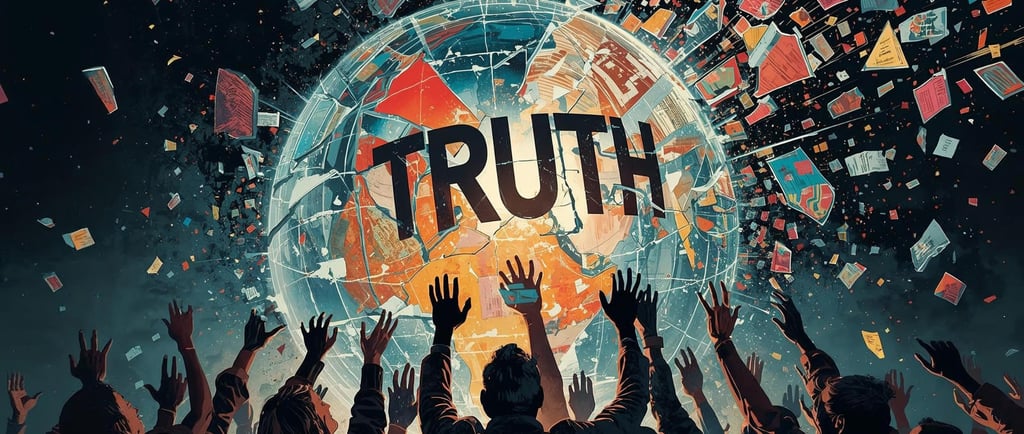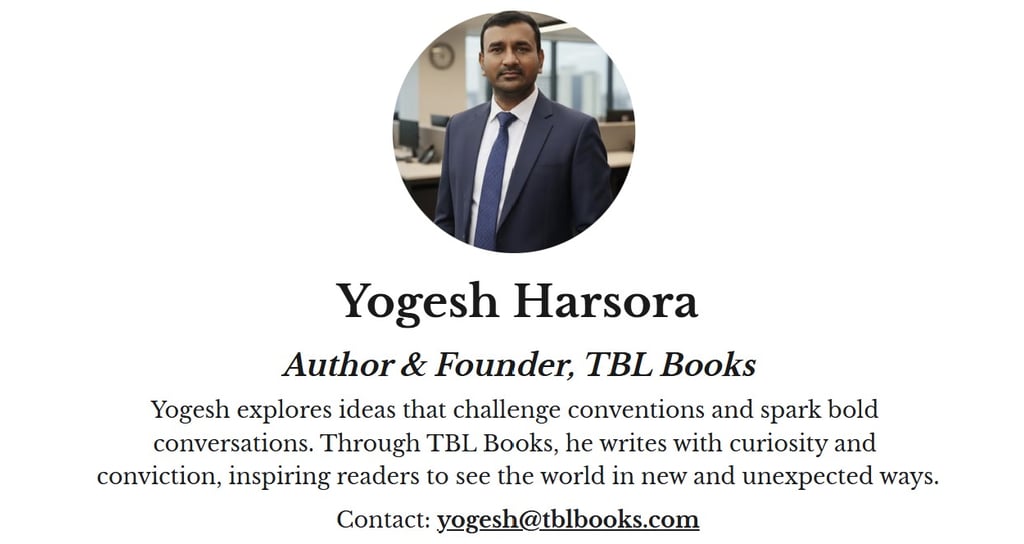The Collapse of Truth: Why the Future Belongs to Stories, Not Facts
In a world where facts have lost their power, the future belongs to storytellers. Discover why truth is collapsing — and why tomorrow’s reality will be built on narratives, not evidence.
FUTURE


The Collapse of Truth: Why the Future Belongs to Stories, Not Facts
Truth died sometime between a conspiracy theory going viral on TikTok and a fact-checker getting ratio'd on Twitter. You probably missed the funeral. We were all too busy arguing about which version of reality felt more authentic.
The corpse is still warm, yet we're already dividing up the inheritance. And here's the uncomfortable reality no one wants to acknowledge: we killed truth not with malice, but with preference. We chose the stories that made us feel good over the facts that made us uncomfortable. We selected the narratives that confirmed our tribes over the data that challenged our beliefs. Truth didn't die from a thousand cuts—it died from a million clicks.
Truth Has Already Lost Ground
Walk into any conversation about politics, and you'll witness truth's obituary written in real time. Facts have become weapons, deployed selectively and discarded when inconvenient. Politicians don't debate policy anymore; they compete in storytelling contests where the most compelling narrative wins, regardless of its relationship to reality.
The media, once truth's supposed guardian, discovered that outrage generates more revenue than accuracy. Why report the complex, nuanced reality of immigration statistics when you can craft a tale of either invasion or humanitarian crisis? Both stories sell. Both stories stick. The messy middle ground of actual data gets trampled in the stampede toward emotional resonance.
Meanwhile, influencers with perfect teeth and ring lights command more trust than institutions with decades of expertise. A twenty-two-year-old with a compelling personal brand can reshape public opinion on vaccine efficacy faster than the CDC can publish a study. We've democratized authority, and the mob has spoken: it prefers beautiful lies to ugly truths.
Consider how myths now masquerade as facts with shameless confidence. Ancient civilizations had gods to explain thunder; we have wellness gurus to explain autism. Both serve the same psychological function—they provide clean, satisfying explanations for messy, complicated realities. The difference is that Zeus never claimed to have peer-reviewed research backing his lightning bolt technique.
The Future Accelerates the Collapse
What we've witnessed so far is just the opening act. The future promises to turn truth's funeral into a full-scale celebration of fiction.
Community identity increasingly crystallizes around shared narratives rather than shared geography or interests. Online tribes form not around what they know, but around what they believe. These aren't mere opinion clusters—they're alternative reality ecosystems where members consume information that confirms their chosen story while algorithmically avoiding anything that might puncture the fantasy.
The speed of story propagation now makes fact-checking a quaint anachronism. By the time journalists verify a claim, it has already traveled through seventeen TikTok remixes, spawned forty-three memes, and inspired three congressional hearings. Truth moves at the pace of research and peer review; stories move at the speed of smartphones and dopamine hits.
Experts, those unfortunate souls still clinging to credentials and methodology, find themselves increasingly sidelined. Why consult a climatologist when a lifestyle blogger can explain global warming in terms of chakras and corporate conspiracies? The expert might have data, but the blogger has a story—and stories feel more true than truth.
We're witnessing the emergence of what could be called "narrative capitalism"—an economy where the most valuable currency isn't information, but interpretation. Raw facts are commodities; the real money lies in packaging those facts into stories that people want to buy, share, and inhabit.
Facts Become Background Noise
Science itself, the supposed bedrock of objective truth, has been dragged into the arena of competing narratives. Climate change isn't debated on the merits of temperature measurements and ice core samples—it's battled through stories of economic apocalypse versus stories of technological salvation. Both sides marshal facts like soldiers, but the war is won by whichever story feels more emotionally satisfying.
Medical research suffers a similar fate. Studies become ammunition in predetermined battles rather than building blocks of understanding. One study suggests coffee prevents cancer; another suggests it causes it. The public doesn't weigh methodologies or sample sizes—they choose the study that confirms their existing relationship with their morning ritual.
Even mathematics, that purest of truths, finds itself subject to narrative interpretation. Statistical analysis becomes storytelling with decimals. Correlation gets confused with causation not through ignorance, but through narrative necessity. The story demands a villain, a hero, a clear cause and effect—and statistics must bend to serve that dramatic structure.
Facts have become background music to the main performance of storytelling. They provide ambient credibility while the real action happens in the emotional resonance between narrator and audience.
The Future Belongs to Storytellers
In this brave new world, power flows not to those who possess truth, but to those who craft the most compelling fictions. The leaders of tomorrow won't be the most informed—they'll be the most narratively gifted.
Political movements understand this instinctively. They don't win by presenting better policies; they win by telling better stories about identity, purpose, and destiny. The most successful politicians aren't policy wonks—they're mythology manufacturers who understand that voters don't choose candidates based on competence, but on which story they want to live inside.
Corporate brands have already made this transition. Companies don't sell products anymore; they sell membership in carefully curated stories. You don't buy Nike shoes—you buy into a narrative about personal achievement and overcoming obstacles. You don't drink Coca-Cola—you participate in a story about happiness and human connection. The product is merely the physical token of narrative membership.
Social movements that master storytelling will eclipse those that rely on facts and rational argument. Black Lives Matter succeeded not because they had the most comprehensive analysis of police brutality statistics, but because they crafted a story about justice and human dignity that resonated across demographic lines. Their opponents might have had contradictory data, but they lacked a compelling counter-narrative.
The future will be shaped by those who understand that humans are storytelling animals first and rational actors second. We don't live in reality—we live in the stories we tell ourselves about reality. And increasingly, we're choosing to live in different stories entirely.
The New Truth
Perhaps this isn't a tragedy. Perhaps it's an evolution.
Truth, as we understood it, was always a shared fiction—a collective agreement that certain methods of understanding reality were more reliable than others. But that consensus has shattered, and in its place, we're seeing the emergence of multiple, competing realities, each with its own internal logic and emotional satisfactions.
The question isn't whether this is good or bad—it's whether we can navigate a world where narrative coherence matters more than factual accuracy. Can democracy function when citizens inhabit fundamentally different stories about their country? Can science progress when research becomes fodder for predetermined conclusions? Can we solve global challenges when we can't agree on which version of the problem we're facing?
The storytellers are already adapting. They're learning to craft narratives that feel true even when they aren't factual. They're discovering that emotional authenticity trumps empirical accuracy. They're mastering the art of making fiction feel more real than reality.
Those still clinging to truth's corpse will find themselves speaking to smaller and smaller audiences, their voices drowned out by the symphony of competing narratives. They'll become curators of an increasingly irrelevant museum, carefully preserving artifacts of objective reality that fewer and fewer people come to visit.
The future doesn't belong to those who know the most. It belongs to those who tell the best stories about what they know. Tomorrow's reality won't be what's real. It will be what's viral.



